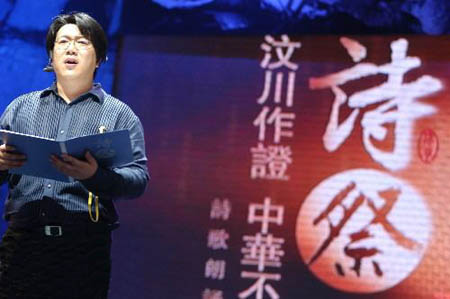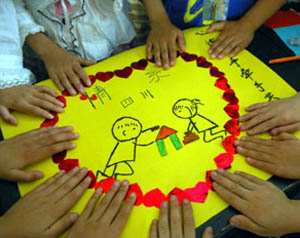At that time Chen Duxiu, a leading revolutionary figure, educator, and philosopher, established an influential Chinese periodical, La Jeunesse, which was the earliest outlet for neo-style poems, attracting Hu Shi, Lu Xun, Li Dazhao and many other significant figures in Chinese literature. Such poems often played an important role in many later historical events.
|

A volunteer recites a poem at a charity gala.
|
Another example: on the day of the 1976 Qingming Festival, traditionally a time for the sweeping of tombs in China, people gathered in Tian'anmen Square to write hundreds of poems mourning the death of late Premier Zhou Enlai while protesting against the "Gang of Four" conspirators led by Jiang Qing. The clique was crushed in October 1976. In 1978, a collection titled Reproduction of the Poems of Tian'anmen was published, considered as a landmark in the history of modern Chinese poetry.
Poetry also enjoyed huge popularity in the golden era of the 1980s. However, this fever didn't last long. In the 1990s, writing poetry became a small-scale, unstructured, minority activity in China. The publication of poetry magazines and books fell into decline. As poets lost the attention of the general public, they turned desperately to gimmicks like nude-recitals and fake suicide.
Zhao Lihua, a member of the Chinese Writers Association, even created a "Lihua-styled" poem, which commonly has no meaning but uses odd structures and absurd oral-word-play. In 2007 Han Han, a renowned and out-spoken young writer, supported by many others including myself, questioned the continued worth of so-called "Chinese modern poems" and "poets" given the value of what had been lost.

Wenchuan quake poems: a landmark of Chinese poetry history? |
Things may be changing. Li Shiying, a writer from Shandong Province, wrote a poem called Wenchuan, I Cry for You Tonight on May 13. After he posted it on his blog, it earned 6 million clicks. 30 newspapers published it while 20 TV and radio stations broadcast it. This was beyond all the expectations of the author, signaling the first and largest poetry revival since the 1990s.
But some literary critics, such as Xie Youshun, suggest that the revival is essentially an emotional outlet for millions of aching souls, and the function of this poetry is to provide such a release. The purpose of the poetry movement is to express the voice of the heart, and it has not truly found a new area of growth. When the pain generated by the calamity gradually fades, Chinese modern poetry will find itself back in its previous position.
On June 12, a new collection called We Are Here Together, including poems by over a hundred poets from Qinghai Province, was published. On June 13, a poetry CD was released by the China Record Corporation. People may expect more to come. But who can predict how long the poetry wave will last, and how many copies of this kind of books and CDs can be sold?